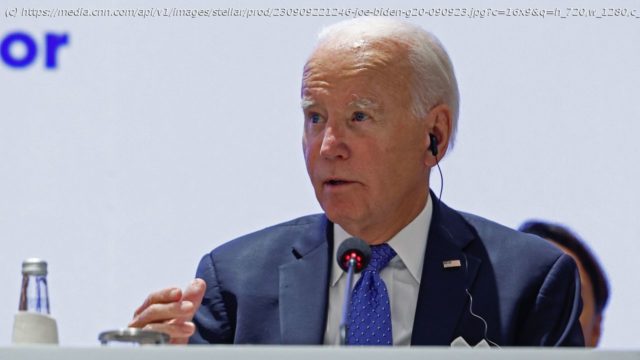President Joe Biden is nearing the end of a whirlwind trip to India and Vietnam for a series of high-profile meetings aimed at countering China’s influence in the developing world.
President Joe Biden is nearing the end of a whirlwind trip to India and Vietnam for a series of high-profile meetings aimed at countering China’s influence in the developing world.
At the G20 in New Delhi and again in Hanoi, Biden used his swing through Asia to make the case that the US is a more reliable and trustworthy partner than Beijing, though he emphasized that he did not want a new Cold War with the Chinese.
“I don’t want to contain China, I just want to make sure we have a relationship with China that is on the up-and-up squared away, and everyone knows what it’s all about,” Biden said. “We have an opportunity to strengthen alliances around the world to maintain stability. That’s what this trip is all about, having India cooperate much more with United States, be closer to the United States, Vietnam being closer with the United States. It’s not about containing China. It’s about having a stable base – a stable base in Indo-Pacific.”
In speaking to General Secretary Nguyễn Phú Trọng of the Communist Party of Vietnam on Sunday, Biden underscored this point.
“I think we have an enormous opportunity,” he said, adding: “Vietnam and the United States are critical partners at what I would argue is a very critical time. I’m not saying that to be polite. I’m saying it because I mean it from the bottom of my heart.”
He referenced supply chains and climate change and hailed “aspirations for a future of greater peace, greater security and greater prosperity.”
“I’m convinced we can achieve it,” he said, adding: “This can be the beginning of even a greater era of cooperation.”
But despite Biden’s hopes, there were still signs of the fractures that are coursing through current geopolitics, both at the G20 summit and in Hanoi. Here are five takeaways from the president’s trip to New Delhi and Hanoi.
US praises G20 statement on Ukraine, even if it’s softer than hoped
Leaders managed to agree on a joint statement laying out shared views on climate change and economic development but showed the fractures within the group by stopping short of explicitly condemning Russia’s invasion of Ukraine.
Diplomats had been working furiously to draft a final joint statement in the lead-up to the summit but hit snags on language to describe the Ukraine war. Officials said they worked through 300 hours of meetings and went through 15 drafts to arrive at an eventual consensus.
The eventual compromise statement amounted to a coup for the summit’s host, Indian Prime Minister Narendra Modi, but still reflected a position far softer than those the United States and its Western allies have adopted individually.
“All states must refrain from the threat or use of force to seek territorial acquisition,” the declaration read, without explicitly singling out Russia for its invasion. The document also stated opposition to the use of nuclear weapons and highlighted the economic effects of the war.
In a reflection of the deep fractures among the G20 nations, the statement acknowledged “there were different views and assessments of the situation.”
The declaration earned the praise of the United States. National security adviser Jake Sullivan called the statement a “significant milestone for India’s chairmanship and a vote of confidence that the G20 can come together to address a pressing range of issues.”
“The G20 statement includes a set of consequential paragraphs on the war in Ukraine. And from our perspective, it does a very good job of standing up for the principle that states cannot use force to seek territorial acquisition,” Sullivan said.
Still, the language differed from last year’s G20 declaration, which stated “most members strongly condemned the war in Ukraine.”
Russia, as a member of the G20, would have to agree on any consensus statement on Ukraine.






